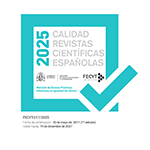¿Acaso es evitable? El impacto de la Antropología en las relaciones e imágenes sociales
Resumen
El texto trata de la fundamentación metodológica, teórica y ética del uso social del conocimiento antropológico y etnográfico: ¿se puede o no realmente aplicar el conocimiento antropológico?, aún más, si acaso es evitable que éste y cualquier otro conocimiento se aplique, ¿se debe hacer tal cosa?, ¿se desea o no se desea? Se defiende que el conocimiento antropológico suele ser aplicable en distintas medidas bajo diferentes condiciones, aunque no todo él lo sea; y de estas condiciones la fundamental es la calidad del trabajo y preparación del investigador. La presencia de los antropólogos tiene sentido –y a veces es imprescindible- cuando el conocimiento de la cultura de las personas es fundamental porque la actuación interfiere en ella. Esa interferencia o esa ingerencia hace esperable, evidentemente, el fracaso de la acción, en tanto genere suspicacia y sufrimiento al destruir o poner en peligro, entre otras muchas cosas, una parte del patrimonio sociocultural sobre el que esa población piensa, actúa, se relaciona y sobre la que hasta cierto punto se puede decir que vive. Hace esperable ese fracaso, porque para evitarlo es necesario poder buscar alternativas sociales y económicas que sean aceptables para la población, incluso imaginarlas y crearlas, alternativas que permitan a la gente elegir sin que sólo las medidas y ofertas pensadas desde fuera o, también, sólo pensadas desde dentro, sean las que se ponen sobre la mesa. Y para eso es necesario el conocimiento de las diferencias y de las desigualdades internas, del valor que se da no sólo a las cosas, sino a cada persona que actúa como representante de la gente, a los que participan en la acción y a la propia participación y representación. Es necesario saber, conocer el entramado sociocultural y su contexto. Es ahí donde una Antropología potente puede verter luz, incluso verterla a lo largo de las múltiples vicisitudes de un proceso de este tipo: comprendiendo lo que hay y a quienes hay, acercándose a las diferentes formas de comprensión de los objetivos, facilitando conocimiento a las formas de negociación de los intereses; y aportando una visión crítica bien fundamentada.Descargas
Descarga artículo
Licencia
La Revista de Antropología Social, para fomentar el intercambio global del conocimiento, facilita el acceso sin restricciones a sus contenidos desde el momento de su publicación en la presente edición electrónica, y por eso es una revista de acceso abierto. Los originales publicados en esta revista son propiedad de la Universidad Complutense de Madrid y es obligatorio citar su procedencia en cualquier reproducción total o parcial. Todos los contenidos se distribuyen bajo una licencia de uso y distribución Creative Commons Reconocimiento 4.0 (CC BY 4.0). Esta circunstancia ha de hacerse constar expresamente de esta forma cuando sea necesario. Puede consultar la versión informativa y el texto legal de la licencia.












